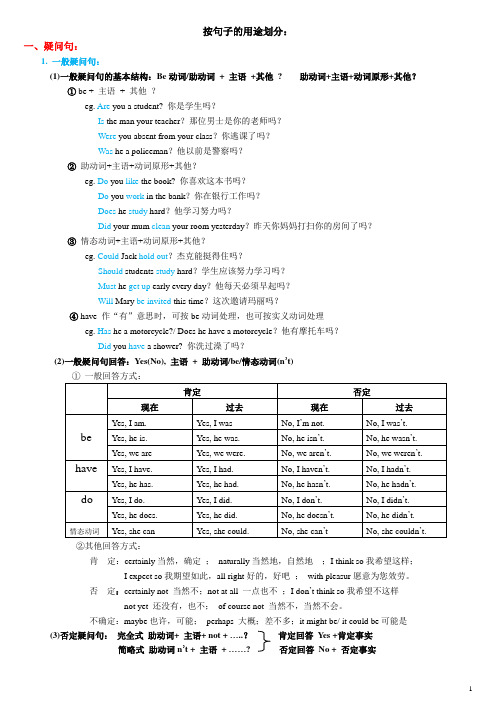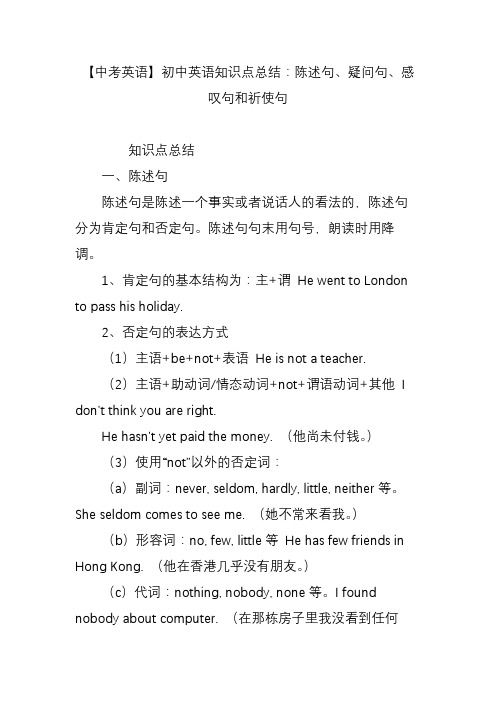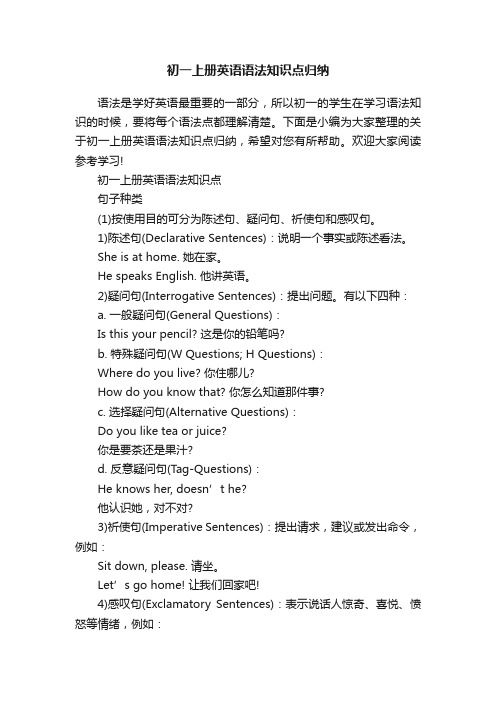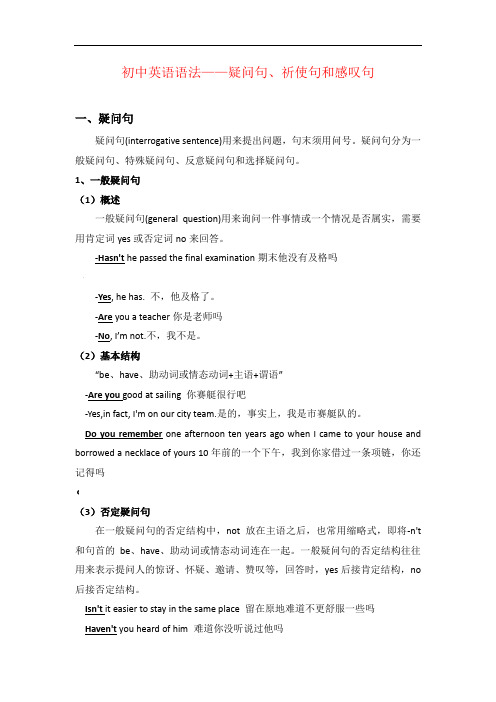初一+英语+感叹句+选择疑问句
英语感叹句与疑问句的区别知识点

英语感叹句与疑问句的区别知识点在学习英语的过程中,感叹句和疑问句就像是一对让人又爱又恨的“小冤家”。
它们看似相似,实则大不相同,就像两个长得有点像但性格迥异的小伙伴。
先来说说感叹句吧。
想象一下,你走在一个美丽的花园里,五颜六色的花朵争奇斗艳,芬芳的香气扑鼻而来。
这时候,你忍不住大喊:“哇塞!这花园真美啊!”这就是一个感叹句。
它是用来表达强烈的情感或惊讶的,语气通常比较激昂。
比如说,“What a beautiful dress!”(多么漂亮的裙子啊!)“How lovely the dog is!”(这只狗多可爱呀!)这里的“what”和“how”就像是打开感叹世界的钥匙。
“what”引导的感叹句,重点在名词上。
像“ What a big apple!” 这里强调的是“apple”这个名词,是说这个苹果真大。
而“how”引导的感叹句呢,重点在形容词或副词上。
比如“ How fast he runs!” 强调的是“fast”这个副词,是说他跑得真快。
再讲讲疑问句。
疑问句就像是个好奇宝宝,总是在问这问那,寻求答案。
比如说,“Are you happy?”(你开心吗?)“Where is my pen?”(我的笔在哪儿?)它是用来提出问题,期待对方给出回答的。
疑问句又分为一般疑问句、特殊疑问句和反意疑问句。
一般疑问句,就像是轻轻敲门,问能不能进来,回答通常是“Yes”或者“No”。
像“ Do you like apples?” (你喜欢苹果吗?)你只要回答喜欢或者不喜欢就行。
特殊疑问句呢,则是有针对性地发问,要具体的信息。
比如“ What color is your bag?” (你的包是什么颜色的?)这时候你就得给出具体的颜色答案,不能简单地说“是”或者“不是”。
反意疑问句有点调皮,先给出一个陈述,然后再反问一下。
比如“ You are a student, aren't you?” (你是个学生,不是吗?)回答的时候得小心,得根据实际情况来,不能被它绕晕了。
陈述句、疑问句、祈使句、感叹句精讲精练

[知识要点梳理]一、英语句子按用途可分为四类:1、陈述句:用来说明事实或说话人的看法,包括肯定句和否定句。
如:He is a doctor.I didn’t go to school yesterday.2、祈使句:用来表示请求、命令。
如:Be quiet!Don’t play with fire!3、问句:用来提出问题。
包括一般疑问句、特殊疑问句、选择疑问句、反意疑问句。
如:Do you like EnglishWhat time is itDoes he like playing football or playing basketballThey went out, didn’t they4、感叹句:用来表达强烈的感情。
如:What a fine day it is!How beautiful!二、用法讲析:1、陈述句:中考出题一般是将肯定句变为否定句。
几种常见形式:(1)含有谓语动词be,变否定时,be后加not即be not……I am a teacher → I am not a teacher.There are some books→There are not any books.(2)句子谓语动词是实义动词(如:work live)时,要用助动词do/does/did + not+ 动词原形。
如:They like swimming→They don’t like swimming.I came late → I didn’t come late(3) 句中含有all,both的句子,变完全否定时,要将all→none, both→neither,both…and…→ neither…nor…要注意谓语动词的变化。
如:All of us watched the TV → None of us watched the TV.Both of them are students.→Neither of them is a student.Both Tom and John have done the homework.→Neither Tom nor John has done the homework.(4)现在完成时、过去完成时态的句子变否定时变为have/has+not+done或had+not+done(5) had better do something变否定时为had better not do…如:You’d better have a rest → You’d better not have a rest.2、疑问句:(1)一般疑问句:一般指用Yes或No回答的疑问句。
初中英语语法思维导图总结 - 句法之疑问句,感叹句,祈使句和陈述句

按句子的用途划分:一、疑问句:1. 一般疑问句:(1)一般疑问句的基本结构:Be动词/助动词+ 主语+其他? 助动词+主语+动词原形+其他?①be + 主语+ 其他?eg. Are you a student? 你是学生吗?Is the man your teacher?那位男士是你的老师吗?Were you absent from your class?你逃课了吗?Was he a policeman?他以前是警察吗?②助动词+主语+动词原形+其他?eg. Do you like the book? 你喜欢这本书吗?Do you work in the bank?你在银行工作吗?Does he study hard?他学习努力吗?Did your mum clean your room yesterday?昨天你妈妈打扫你的房间了吗?③情态动词+主语+动词原形+其他?eg. Could Jack hold out?杰克能挺得住吗?Should students study hard?学生应该努力学习吗?Must he get up early every day?他每天必须早起吗?Will Mary be invited this time?这次邀请玛丽吗?④have 作“有”意思时,可按be动词处理,也可按实义动词处理eg. Has he a motorcycle?/ Does he have a motorcycle?他有摩托车吗?Did you have a shower? 你洗过澡了吗?(2)一般疑问句回答:Yes(No), 主语+ 助动词/be/情态动词(n’t)②其他回答方式:肯定:certainly当然,确定;naturally当然地,自然地;I think so我希望这样;I expect so我期望如此,all right好的,好吧;with pleasur愿意为您效劳。
否定:certainly not 当然不;not at all 一点也不;I don’t think so我希望不这样not yet 还没有,也不;of course not 当然不,当然不会。
【中考英语】初中英语知识点总结:陈述句、疑问句、感叹句和祈使句

【中考英语】初中英语知识点总结:陈述句、疑问句、感叹句和祈使句知识点总结一、陈述句陈述句是陈述一个事实或者说话人的看法的,陈述句分为肯定句和否定句。
陈述句句末用句号,朗读时用降调。
1、肯定句的基本结构为:主+谓He went to London to pass his holiday.2、否定句的表达方式(1)主语+be+not+表语He is not a teacher.(2)主语+助动词/情态动词+not+谓语动词+其他I don't think you are right.He hasn't yet paid the money. (他尚未付钱。
)(3)使用“not”以外的否定词:(a)副词:never, seldom, hardly, little, neither等。
She seldom comes to see me. (她不常来看我。
)(b)形容词:no, few, little等He has few friends in Hong Kong. (他在香港几乎没有朋友。
)(c)代词:nothing, nobody, none等。
I found nobody about computer. (在那栋房子里我没看到任何人。
)二、疑问句疑问句的主要交际功能是提出问题,询问情况。
分为一般疑问句、选择疑问句、特殊疑问句和反意疑问句。
1、一般疑问句通常用来询问一件事情是否属实。
答句通常是“yes或no”。
句型一:Be +主语+ …?Are these books on the desk?这些书在桌子上吗?句型二:Do / Does / Did + 主语+谓语+…?Do you like English?你喜欢英语吗?句型三:情态动词+ 主语+ 谓语+…?Must I finish my homework now?我必须现在完成我的家庭作业吗?句型四:Have / Has + 主语+ 过去分词+…?Have you heard from him?你收到他的来信吗?另外,还有以be动词、助动词或情态动词的否定缩写形式开头的一般疑问句,这种句子一般表示请求、惊讶和对事物的看法等,回答时所用的yes和no表达的意思和汉语的习惯不同。
初中英语语法归纳陈述句、疑问句、祈使句和感叹句

—___C___ . I like pop music.
A. Both
B. None
C. Neither D. Either
概念
结构
例句
—Must I finish the report today?
用yes, no来回 答的疑 问句为 一般疑 问句。
情态动词+主 语+ 动词原形
+ 其他?
助动词+主语 +动词原形/现 在、过去分词 +其他?
我今天必须完成这份报告吗? —Yes, you must. 是的,你必须完成。 —No, you needn’t./you don’t have to. 不, 你不必完成。
(2020·云南)
23. —___A_____was the car invented?
— It was invented in 1885.
A. When
B. Which
C. Who
D. Where
(2020湖北宜昌)
30. —_B_____ did the rules about keeping civilized dogs(文明
Do you want to go to the movies with me? 你想和我一起去看电影吗? Have you been to Tibet你去过西藏吗?
(2020甘肃白银) 句型转换。按括号内的要求转换下列句型。 (每空限填一词)
2. The Brows were watching TV when they got the phone call last night.(改为一般疑问句) _W__e_r_e____the Browns _w__a_t_ch__in_g_ TV when they got the phone call last night?
外研版英语七年级下册语法Module12--- 感叹句+选择疑问句

你想要哪个,茶还是咖啡?
Which would you like, tea or coffee? Coffee,please
1.—Which do you prefer,traditional Western music C pop
music?
—Pop music.
A.but
B.as
C.or
D.from
2.They play traditional music.(用 Bejing Opera改为选择疑
问句)
Do they traditional music or Beijing Opera?
3.He can play the piano.(用 the violin改为选择疑问句)
Jay跳舞跳得
Jay很帅。 多么帅呀! 多么好呀!
How
型
Jay is
How
How
very handsome well handsome. Jayt 和 How 分两 家
What 修饰名词 (什么)
How 修饰形容词,副词 (怎样)
1.What+a/an+形+[CN]单名 2.What+形+[CN]复名 3.What+形+[UN]不可数名词
M12 感叹句空和白选择演疑示问句
PART ONE
感叹句
Jay是一个 歌手。
Jay是一个 Jay是一个 多么帅的 帅气的歌手。 歌手呀!
Jay is a singer.
Jay is a handsome
singer.
Jay?is a
hand?some
singer!
初中英语感叹句归纳与练习

初中英语感叹句归纳与练习英语感叹句常用"what"和"how"引导,"what"和"how"与所修饰的词置于句首,其它用陈述句语序。
部分一、由"what"引导的感叹句:"what"意为"多么"用作定语,修饰名词(被强调部分),单数可数名词前要加不定冠词a/an,复数可数名词或不可数名词前不用冠词。
这类句子的结构形式是:what+(a/an)+adj.+n.+主语+谓语+(itis).如:①Whataclevergirlsheis!多么聪明的姑娘呀!②Whataninterestingstoryitis!多么有趣的故事呀!③Whatgoodchildrentheyare!他们是多么好的孩子呀!④Whatbeautifulflowerstheyare!多么漂亮的花呀!⑤Whatdeliciousfooditis!多么有味的食物呀!⑥Whatheavysnowitis!多么大的雪呀!二、由"how"引导的感叹句:"how"意为"多么",用作状语,修饰形容词或副词(被强调部分)。
假设修饰形容词,则句中的谓语动词用系动词;假设how修饰副词,则句中的谓语动词用行为动词,这类句子的结构形式是:How+adj.(adv.)+主语+谓语+(itis).如:①Howcolditistoday!今天多么冷呀!②Hownicethepicturesare!多么漂亮的图画呀!③Howhappytheylook!他们显得多么快乐呀!④Howwellshesings!她唱得多好呀!⑤Howhardtheyareworkingnow!他们干得多么起劲呀!三、在表示同一意义时,英语感叹既可用"what"引导,也可用"how"引导。
初中英语语法选择疑问句和感叹句 (共23张PPT)

选择疑问句
Do you like … or …? I like …
Online Shopping
Supermarket shopping
desks
listen to music
speak Chinese
Do you like listening to music or speaking Chinese? I like …
Do you like … or …? I like …
— Is this by Strauss or Mozart? It’s by Strauss. —Do you like traditional Western music or pop music? Well, I like both.
用or连接; 回答时不能用yes或no。 语调是前升后降。
She tried the small chair at last. nice and comfortable What a nice and comfortable
chair!
Walked into .Three beds. Didn’t like… or… The small bed
Did she like the small bed or the big bed?
sit down, because , tired . First , tried big ,but comfortable. Then tried middle . Either . Finally tried small
Did she try the small chair or the middle chair at last ?
2.To write five questions with “or” in them.
初一+英语+感叹句+选择疑问句

2.Cao Wenxuan’s new book has just__. Let’s go and buy one.
A come over B come down C come on D come out
3.Do you know that there are many different__animals in the zoo?
A if B but C so D or
7.Project Hope has built many schools__biபைடு நூலகம் classrooms and libraries.
A in B of C for D with
8.What does your new English teacher look like?
Do you like apples or pears?
Would you like tea or coffee?
Should I go there by bus or by train?
Did you call or e-mail him?
I called him.
Is this a Chinese book or an English book?
Oh,____
A Yes, it is B No, it isn’t C An English book D A music book
初一英语第四单元复习题:
一.汉译英
1.最后老人的梦想没有实现。
2.这是一种新式的汽车。
3.我们家中没什么食物了。
4.这个外国人不仅会说英语,而且会说汉语。
5.今天早上我起床晚了,所以我上学迟到了。
中考英语初中英语知识点总结陈述句疑问句感叹句和祈使句

【中考英语】初中英语知识点总结:陈述句、疑问句、感叹句和祈使句知识点总结一、陈述句陈述句是陈述一个事实或者说话人的看法的,陈述句分为肯定句和否定句。
陈述句句末用句号,朗读时用降调。
1、肯定句的基本结构为:主+谓 .2、否定句的表达方式(1)主语表语 a .(2)主语+助动词/情态动词谓语动词+其他 I 't .'t . (他尚未付钱。
)(3)使用“”以外的否定词:(a)副词:, , , , 等。
. (她不常来看我。
)(b)形容词:, , 等 . (他在香港几乎没有朋友。
)(c)代词:, , 等。
I . (在那栋房子里我没看到任何人。
)二、疑问句疑问句的主要交际功能是提出问题,询问情况。
分为一般疑问句、选择疑问句、特殊疑问句和反意疑问句。
1、一般疑问句通常用来询问一件事情是否属实。
答句通常是“或”。
句型一: +主语+ …??这些书在桌子上吗?句型二: / / + 主语 +谓语+…??你喜欢英语吗?句型三:情态动词 + 主语 + 谓语+…?I ?我必须现在完成我的家庭作业吗?句型四: / + 主语 + 过去分词+…??你收到他的来信吗?另外,还有以动词、助动词或情态动词的否定缩写形式开头的一般疑问句,这种句子一般表示请求、惊讶和对事物的看法等,回答时所用的和表达的意思和汉语的习惯不同。
例如:——'t ?难道他不高吗?—— , .不,他很高。
2、特殊疑问句以疑问词开头,对句中某一成分提问的句子叫特殊疑问句。
常用的疑问词有:、、、、、、、等。
例如:?﹖3、选择疑问句提出两个或两个以上可能的答案供对方选择。
选择疑问句的两种或两种以上的情况用连接,不能用或回答,而是就其选择内容直接回答。
这类疑问句有两种形式:一种是:一般疑问句被选择部分?,这一类选择疑问句通常都是在前一个供选择的答案用低升调,后一个用降调;如果有两个以上供选择的答案,则在最后一个用降调,其余都用低升调。
例如: a , a , a `?你是要喝杜松子酒,还是威士忌酒,还是啤酒?另一种是:特殊疑问句+被选择部分(A)被选择部分(B)?也是在语调上有所区别。
英语学习 疑问句、感叹句

疑问句与感叹句一一般疑问句可以用yes/ no回答的疑问句。
一般是把系动词或情态动词提到主语之前,或添加助动词并提到主语之前。
也有yes/ no之外的回答方式。
如sure, certainly, surely, of course, I think so, all right, certainly not, not at all, never, sorry, not yet, I’m afraid not等。
例如:Is this book interesting?Do you like music?Can you lift the big rock?二特殊疑问句由疑问词引导的疑问句。
主要用来询问信息。
疑问词有:who, whom, what, where, when, why, how固定短语构成的疑问句:what about, how about, how come例如:Where is my pen?Who is that boy standing behind the door?What shall we do next?三选择疑问句说话者提出两个或两个以上的答案,供对方选择。
用or连接两个并列成分。
例如:Which one do you like, apple or pear?Are you German or French?四反诘疑问句以否定形式出现的疑问句。
含有反诘口气,并非疑问,用于反问、责怪或证实一件实事。
一般用助动词的否定缩略形式。
例如:Don’t you know you are wrong again?五反意疑问句附加在陈述句后的简单问句,征询前面陈述句所说的事情的肯定或否定的意见,或希望陈述句所说的得到证实。
结构:肯定,否定?否定,肯定?例如:You like him, don’t you? 你喜欢他,对不对?You don’t like him, do you? 你不喜欢他,是不是?Note:1 主语为不定代词no one, nobody, everyone, someone, everybody, somebody, none等,附加问句的主语用they(强调全部时),或he(强调个体时)如:No one in your class can work out this problem, can they?Everyone like music, don’t they?2 主语为不定代词everything, anything, something, nothing时,附加问句的主语用it如:Nothing is left behind, isn’t it?3 one表示人做主语,附加句用one(正式)或you(非正式)如:One can never be blamed for honesty, can one?4 this/ that 用it,these/ those用they如:This is your book, isn’t it?Those are your books, aren’t they?5 there be句型在附加问句中庸there如:There is a computer in the room, isn’t there?6 must表示必须或禁止Must,mustn’t You mustn’t smoke here, must you?有必要Needn’t He must finish his work today, needn’t he?一定,想必(表推测)现在时态you must be happy Aren’t you过去时态it must rained last night Didn’t it完成时态he must have studied english for years Hasn’t he7 ought to反意疑问句部分用oughtn’t 或shouldn’t如:You ought to finish it yesterday, shouldn’t you?8 used to反意疑问句部分用didn’t或usedn’t如:she used to go to movies, didn’t she?9 had better反意疑问句部分用hadn’t 或shouldn’t如:You had better go now, hadn’t you?10 have/had to反意疑问句部分用do的相应形式如:She had to go home before eight, doesn’t she?11 陈述部分主句含有否定或半否定意义的副词或代词(如no, never, nothing, nowhere, rarely, hardly, seldom, few, little)附加疑问句用肯定式如:There is little water in the bottle, is there?12 表示愿望的I/ We wish, 疑问部分用may如:I wish you happiness, may I?13 I am的反意疑问句:am I not(正式)aren’t I(非正式),ain’t I(非标准)如:I am great, am I not?14 a, 祈使句反意疑问句部分用will you/ won’t youb, Let’s 开头的后面问句用shall we; let us或let me开头的祈使句用will youC,陈述部分为否定的祈使句可以用will you或can you如:Open the window, will you?Let’s go shopping this afternoon, shall we?Let us go shopping this afternoon, will you?Don’t leave the lights on, will you?15陈述部分如果是并列句,附加句应与临近的分句一致陈述部分为主从复合句,附加疑问句一般与主句一致如:John can speak Spanish, and his wife also can speak Spanish, can she?He said he was late for the meeting, did’t he?16 陈述部分是I’m sure, I’m afraid, I don’t think(suppose, expect, imagine, believe)+宾语从句结构,附加问句与从句一致如:He said he was late for the meeting, wasn’t he?六感叹句How:做状语,修饰形容词、副词或句子How + 形容词/副词+ 主语+ 谓语!How + 主语+ 谓语!How + 形容词+ (a/ an)+ 名词!例如:How great changes we have had these years!How short life is!How wonderful a plan!What:做定语,修饰名词(名词前可以有冠词或形容词)What + (a/ an)+ 形容词+ 名词+ (主语+谓语)!What + 形容词+ 可数名词+ 其他!What + 形容词+ 不可数名词+ 其他!例如:What a fine day!What a great pity you missed the lecture!What great fun playing computer!。
初一上册英语语法知识点归纳

初一上册英语语法知识点归纳语法是学好英语最重要的一部分,所以初一的学生在学习语法知识的时候,要将每个语法点都理解清楚。
下面是小编为大家整理的关于初一上册英语语法知识点归纳,希望对您有所帮助。
欢迎大家阅读参考学习!初一上册英语语法知识点句子种类(1)按使用目的可分为陈述句、疑问句、祈使句和感叹句。
1)陈述句(Declarative Sentences):说明一个事实或陈述看法。
She is at home. 她在家。
He speaks English. 他讲英语。
2)疑问句(Interrogative Sentences):提出问题。
有以下四种:a. 一般疑问句(General Questions):Is this your pencil? 这是你的铅笔吗?b. 特殊疑问句(W Questions; H Questions):Where do you live? 你住哪儿?How do you know that? 你怎么知道那件事?c. 选择疑问句(Alternative Questions):Do you like tea or juice?你是要茶还是果汁?d. 反意疑问句(Tag-Questions):He knows her, doesn’t he?他认识她,对不对?3)祈使句(Imperative Sentences):提出请求,建议或发出命令,例如:Sit down, please. 请坐。
Let’s go home! 让我们回家吧!4)感叹句(Exclamatory Sentences):表示说话人惊奇、喜悦、愤怒等情绪,例如:What good news it is! 多好的消息啊!初一英语必备语法知识单数句变复数句1. 可数名词单数要变为其相应的复数形式。
It is a box.→ They are boxes.2. 各个人称代词要由单数形式变为复数形式。
She is a girl.→ They are girls. I am at home.→ We are at home.3. am或is 要变为are.He is a teacher. → They are te achers.4. 指示代词this或that要分别变为these或those。
初中英语语法——感叹句,讲解,练习和答案

感叹句感叹句的六种句式一般说来,感叹句是由what 或how 开头的,它有两个类型,六种句式。
1.用what 引导的感叹句有三种句式,此时,what 为形容词,用作定语,修饰它后面的名词或名词词组(即感叹部分是名词性短语)。
1). What +a / an + 形容词+可数名词单数+主语+谓语!e.g.: What a fine day it is!多么好的天气啊!(辅音音素前用a)What an old building that is!那是一栋多么破旧的楼房啊(元音音素前用an)2). What + 形容词+可数名词复数形式+主语+谓语!e.g.: What good teachers they are!他们是多么好的老师啊!What beautiful flowers these are!这些是多么美丽的花啊!3). What + 形容词+不可数名词+主语+谓语!e.g.: What thick ice we are having here!我们这儿的冰多厚啊!What round bread it is!这是一块多么圆的面包啊!2.用how 开头的感叹句也有三种句式,此时,how 是副词,用作状语,修饰后面的形容词、副词或动词。
4). How +形容词+主语+谓语!(即谓语动词是连系动词)e.g.: How hot it is today!今天天气多热啊!How beautiful the flowers are!这些花多么美丽啊!5). How +副词+主语+谓语!e.g.: How hard he works!他工作多么努力啊!How well she sings!她歌唱得多好啊!6). How + 主语+谓语!(即谓语动词是行为动词) e.g.: How she dances!她跳舞跳得多好啊!★注意:what 和how 引起的感叹句,在口语中常可以省略主语、谓语或其它句子成分。
e.g.: How cold (it is )!What a good girl!What delicious fish!(三)陈述句变感叹句全解如何确定使用what还是使用how?一般可以这样来确定:位于主语之前的是名词短语时用what,是形容词或副词短语时用how。
Module 12 western music外研版英语七下讲义(学生版)

教学辅导教案口语训练+预习七下第12模块+ (语法)感叹句选择疑问+ 话题作文训练学科英语学生学校知识点1、七下M12 语法:感叹句,选择疑问句2、话题作文解题技巧学习目标1、掌握七下M12 语法:感叹句选择疑问句重点考点2、掌握话题作文解题技巧学习重点感叹句选择疑问句学习难点感叹句选择疑问句【口语练习】话题22:Western music情景提示:Lucy周末喜欢在家听音乐,她最喜欢的是西方音乐,因为她觉得它非常优美,她最喜欢的音乐家是Mozart。
说话:请根据话题和要点提示,用英语在 1 分钟内说一段话,(至少 5 句)1.Daming喜欢听音乐,周末他经常和朋友一起去听音乐会。
2.他最喜欢流行音乐… ….(量喜爱的歌手及原因)3.他… …(感受或评价)【温故知新】A)用方框中所给词或短语的适当形式填空。
Ⅰ. 根据首字母或中文提示拼写单词1. He came first in the singing competition. He got high_________ (赞扬) from us.2.Mr Wang_________(连接)the computer to the printer correctly yesterday.3. The thick haze (雾霾) over the city_________ (影响) our lives greatly.4.We should not be________(不耐烦的) while waiting for others.5. I can't decide_________ (是否) or not I should accept the invitation.Ⅱ. 用括号内所给单词的适当形式填空1.It's_________(polite) to talk loudly in the reading room.2. The_________(Britain) people speak English.3. You must be_________(care) when you cross the road.4.What about________(go) for a ride in the park?5._________(not be) late for class, boys and girls.【新授课】知识点:七下第12模块重点1. It goes through Vienna.through 意为“穿过,经过”,常与pass, go, walk 等动词连用。
疑问句和感叹句

中考英语语法复习点:疑问句和感叹句(一)句子种类概述句子按种类可分为陈述句、疑问句、祈使句和感叹句。
(二)基础知识梳理1.疑问句疑问句就是提出问题,让对方作出回答。
英语中有四种疑问句,即一般疑问句、特殊疑问句、选择疑问句、反意疑问句。
1)一般疑问句用于询问一个事实是否属实,其回答通常是Yes或No。
其结构为:be,will,have,助动词+主语+(主动词)/宾语如:Is she a university teacher?Will it be windy tomorrow?Did he take part in the maths contest yesterday?2)特殊疑问句特殊疑问句对句中某一特定部分提问,以特殊疑问词开头根据实际情况,不必用Yes或No回答。
常见的特殊疑问词有what,who,whom,when,what,time,where,why,which,whose,how old,how many+可数名词复数,how much+不可数名词,how long,how far,how fast,how soon等。
其结构为:疑问句+一般疑问句语句如:Who has lunch fastest at school in our class?What are you doing now?How long have you lived here?3)选择疑问句选择疑问句通常提供两种或两种以上情况,询问对方选择哪一种。
回答时选择一种,不必用Yes或No。
一般疑问句+A or B如:Is there any coffee or water in the cup?Do you often play basketball or play the piano?特殊疑问句,A or B?或A,B or C?如:Which is the biggest, the moon, the earth or the sun?Which do you like better, the record or the ball?4)反意疑问句由两部分组成,前半句为陈述句,后半句是一个附着在前半句上的简短问句,回答时用Yes 或No。
初中语法-陈述句、疑问句、祈使句、感叹句

初中英语语法——疑问句、祈使句和感叹句一、疑问句疑问句(interrogative sentence)用来提出问题,句末须用问号。
疑问句分为一般疑问句、特殊疑问句、反意疑问句和选择疑问句。
1、一般疑问句(1)概述一般疑问句(general question)用来询问一件事情或一个情况是否属实,需要用肯定词yes或否定词no来回答。
-Hasn't he passed the final examination期末他没有及格吗·-Yes, he has. 不,他及格了。
-Are you a teacher你是老师吗-No, I’m not.不,我不是。
(2)基本结构“be、have、助动词或情态动词+主语+谓语”-Are you good at sailing 你赛艇很行吧-Yes,in fact, I'm on our city team.是的,事实上,我是市赛艇队的。
Do you remember one afternoon ten years ago when I came to your house and borrowed a necklace of yours 10年前的一个下午,我到你家借过一条项链,你还记得吗《(3)否定疑问句在一般疑问句的否定结构中,not放在主语之后,也常用缩略式,即将-n't 和句首的be、have、助动词或情态动词连在一起。
一般疑问句的否定结构往往用来表示提问人的惊讶、怀疑、邀请、赞叹等,回答时,yes后接肯定结构,no 后接否定结构。
Isn't it easier to stay in the same place 留在原地难道不更舒服一些吗Haven't you heard of him 难道你没听说过他吗Can't you just wear a flower instead 难道不可以就戴朵花吗- Didn't he come to see you yesterday他昨天没有去看你吗-No, he didn't.是的,他没来。
初中英语疑问句、祈使句、感叹句(39张)

1.Don’t forget to put the book back on the shelf,_C___? A.do you B.don’t you C.will you D.won’t you
2.—The film Hoot(拯救猫头鹰) is on at the movie. Let’s go to see it,_B___?
A.Yes,I was B. Yes,I wasn’t C. No, I was
5.—Few well-know singers came to the concert, did they?
--__B__. Such as Andy Lau and Jay Chou.
A.No,they didn’t B.Yes, they did
2. 当must表示“必须”时,反意疑问部分用 mustn’t.
You must work harder next term, mustn’t you?
3. 当must表示“必要”时,反意疑问部分用 needn’t.
You must go home right now, needn’t you? 陈述句中有mustn’t(表示“禁止”)时, 反意疑问部分用must.
2. The boy has a new MP4, _A___?
A.doesn’t he B.isn’t he
C.does he D.is he 3.—You are new here, _D____?
A.do you B.don’t you
C.are you D.aren’t you
4.—You were injured in the accident, weren’t you? --_A___.
- 1、下载文档前请自行甄别文档内容的完整性,平台不提供额外的编辑、内容补充、找答案等附加服务。
- 2、"仅部分预览"的文档,不可在线预览部分如存在完整性等问题,可反馈申请退款(可完整预览的文档不适用该条件!)。
- 3、如文档侵犯您的权益,请联系客服反馈,我们会尽快为您处理(人工客服工作时间:9:00-18:30)。
(2)what引导的感叹句
1.what +a/an+形容词+可数名词单数+主语+谓语!
What a nice present it is!它是一件多么好的礼物呀!
What a lovely dog it is !它是一只多么可爱的狗呀!
6.我和朋友一起参加了脱口秀节目。
7.他们也想去参加颐和园。
8.在夏天,白天变长。
9.不要玩火,太危险。
10.如果物价涨得太高,政府就不得不采取措施来阻止。
11.老师要求每个人都要完成作业。
12.下个月她要出国。
13.将来会发生什么?
14.我想厨师应该会做这道菜。
二.选择题
1.Ilike flowers,Ihope to study at a school__many flowers and trees in it.
一.感叹句
用法:感叹句表达一种较为强烈的感情,如喜悦、赞叹、惊异、愤怒、厌恶等感情。
种类:常见的感叹句可以分为三类:
(1)在句式上与陈述句没有什么区别,只是把句号变成感叹句。在口语中则是通过说话的语气来表达强烈的感情。
I am sohappy!我是如此的高兴!
He is so tired!他太累了!
2.What +形容词+可数名词复数+主语+谓语!
What beautiful flowers they are!多么漂亮的花呀!
What good children they are!他们是多么好的孩子呀!
3.What +形容词+不可数名词+主语+谓语!
What fine weather it is today!今天天气多好呀!
4.How+主语+谓语!
How times flies!光阴似箭!
注意:由what引导的感叹句与由how引导的感叹句有时可以转换,但句中部分单词的顺序要有所变化。
How beautiful a girl she is =whata beautiful girl she is!
她是多么漂亮的一个女孩呀!
Do you like apples or pears?
Would you like tea or coffee?
ShouldIgo there by bus or by train?
Didyou call or e-mail him?
Icalled him.
Is this a Chinese book or anEnglishbook?
Thank you!
A What a B What C How D How a
二.选择疑问句
用法:选择疑问句表示向对方给出俩个可供选择的答案,中间用or连接。选择疑问句中or连接的可以是不同的内容,如:可以是俩个名词、动名词或介词短语等。但是or连接的内容一定是并列的,也就是说or的前面是名词,后面也应该是名词,or前面是动词,则后面也必须是动词。回答是不能用Yes或No来回答,要从俩者中选择其中一个回答。
Oh,____
A Yes, it is B No, it isn’t C AnEnglishbook D A music book
初一英语第四单元一种新式的汽车。
3.我们家中没什么食物了。
4.这个外国人不仅会说英语,而且会说汉语。
5.今天早上我起床晚了,所以我上学迟到了。
A is B am C are
5.The water here is polluted__even the animals can’t drink it.
A so B because C though
Yes,Ido. AndIalso know that some of them are__scaring.
A kinds of, kind of B kinds of , kinds of C kind of , kinds of D kind of, kind of
4.This is my twin sister, Lucy. Not only she but alsoI__good at drawing.
2._____delicious food my mother cooks every day!
A What a B What C How D How a
3.____ interesting book it is !
A How B What C What an D How a
4._____ nice dress it is !
What delicious cakes these are! = How delicious these cakes are!
这些事多么好吃的蛋糕啊!
练习题:
1._____ wonderful Yang Liping’s dance is!
A What B What a C How D How a
巨人教育辅导讲义
学员编号(卡号):年级:初一第7次课
学员姓名:辅导科目:英语教师:王冬娣
课题
感叹句和选择疑问句
授课时间:2013-4-13
备课时间:20134-8
教学目标
学会感叹句和选择疑问句的用法
重点、难点
分区how和what 引导的感叹句
考点及考试要求
正确使用what 和how 引导的感叹句
教学内容
A in B with C on D by
2.Cao Wenxuan’s new book has just__. Let’s go and buy one.
A come over B come down Ccomeon D come out
3.Do you know that there are many different__animals in the zoo?
What important news it is !多么重要的消息呀!
(3)How引导的感叹句
1. How+形容词/副词+主语+谓语!
How careful she is!她多么细心呀!
How fast he runs!他跑的多快呀!
2. How+形容词+ a/an+可数名词单数+主语+谓语!
How beautiful a girl she is!她是个多么漂亮的姑娘呀!
